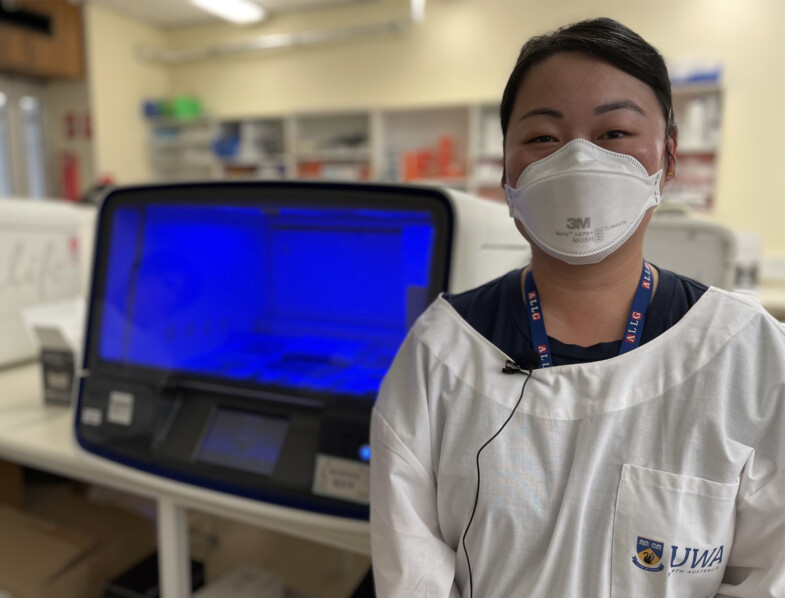Cancer researcher, Belinda Guo, knows that one of the biggest issues for people with myeloproliferative neoplasms (a group of rare blood cancers), is not knowing if the cancer will progress.
Dr Belinda Guo and her team at the University of Western Australia’s Translational Cancer Pathology Laboratory have invented a new blood-based test that detects specific changes in the blood of patients diagnosed with myelofibrosis.
With funding from Cancer Council WA, they are now working with clinicians to assess the blood of individuals who have undergone a bone marrow transplant to see if the transplant has worked.
We sat down with Belinda to hear more about her research project. Read the full interview below.
What is your current research project about?
“We are looking at a group of blood cancers called myeloproliferative neoplasms (MPN), where the bone marrow produces too many blood cells for the body.
“While for most patients this can be generally well managed, have a lifetime risk of progressing to an aggressive and potentially fatal state – myelofibrosis – where their bone marrow starts to fail.
“We want to understand how this happens, what causes this switch to happen, and if there is a way that we can identify or better predict when this is going to happen, all by a simple blood test.
“A bone marrow transplantation is currently the only potential cure available for patients with myelofibrosis. It is quite a big procedure for the patient and unfortunately isn’t always successful. The procedure also requires multiple bone marrow examinations to check if the transplant has worked – these examinations are also fairly invasive and confronting for patients.
“We are working to develop a way to determine whether the transplant has been successful with a blood test rather than a bone marrow examination. In theory, a bone marrow transplant should be a cure for the patient, so the blood tests after the transplant should show that 100% of the cells that the patient is producing are normal.
“Essentially, with this blood-based test, we can identify whether the cancer is still active or not.”
How do you see your research impacting the community in the future?
“One of the biggest issues with this cancer is that there is a 15 to 20 per cent chance of the MPN cancer progressing to aggressive myelofibrosis, but nobody can tell you if it will happen or not, and it can take decades for it to actually happen.
“I understand that one of the major concerns for patients and their families is that from the moment of diagnosis, they’re stuck wondering “What is going to happen to me?” So, there’s that uncertainty which weighs down on them.
“A regular simple test could let them know that their cancer was not progressing and provide a lot of reassurance, particularly for those who are at lower risk. Equally, for those patients identified to be at higher risk of their cancer progressing, the test could allow them to consider treatment earlier, be eligible for trials earlier, or gain access to new therapies that they may not have otherwise had access to.”
“Ultimately, we are trying to increase the chance of curing the disease.”
When do you think your research could be accessible in the community?
“I’m hoping we may be able to see this test being trialled by pharmaceutical companies within the next five years. We’ve already had some conversations with trial teams and some of their companies are quite interested in what this test could potentially do.”
What inspires you to do this work?
“During my PhD, I wanted to do something that was more applied, where I could see where my research would be used one day.
“Having community representatives and industry links helps me understand what could be helpful and refine my research. It inspires me because I know that this is actually going to make a difference in addressing something that is really quite critical. Seeing the impact of this research really inspires me to do this work. I love the work we are doing because I see the impact that it could have, and that is so encouraging when we have even a small win.
“We know that by doing this research, we’re providing patients with hope.”
A message from Belinda to our donors
“It doesn’t matter how much you contribute – any contribution is always valuable.
“I think Cancer Council WA fills a really critical gap in research funding in WA. There are a lot of national opportunities, which often go over to the East Coast because of the large institutes that are there.
“There’s so much talent in WA that misses out on those opportunities, and I think this is where Cancer Council WA’s donors play a huge role. They are supporting not only the early career researchers but also new ideas, that at a national level don’t get funding because it’s either too new or there’s just not enough pilot data. The donations really help make those new ideas happen and the research builds from there.
“All of the people who have donated to Cancer Council WA have helped me establish myself as a researcher and build this program of research.”
As a community-funded organisation, we rely on donations to help fund local cancer research, such as Dr Belinda Guo’s. If you’d like to make a difference, please donate today.
For more information
- Read more about our research funding strategy and how we utilise your vital donations.
- Donate to support local cancer research today.
